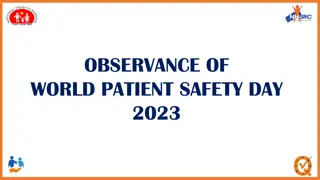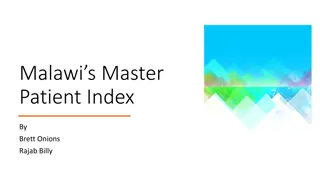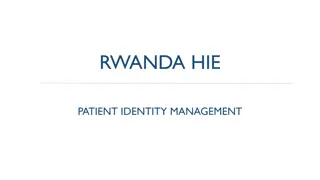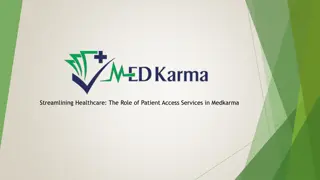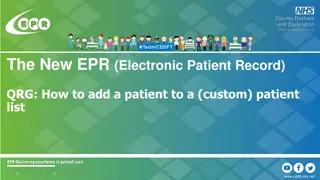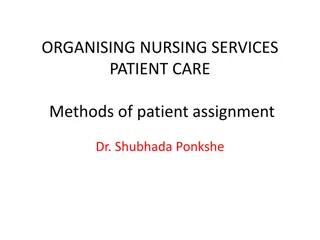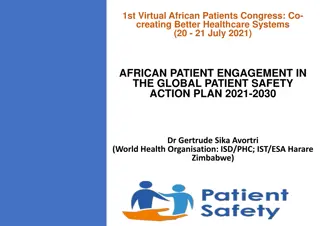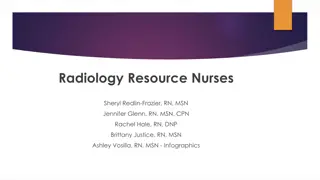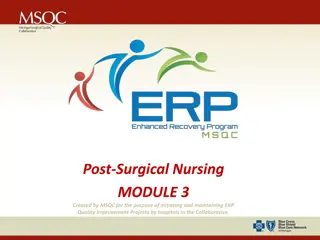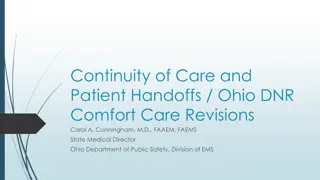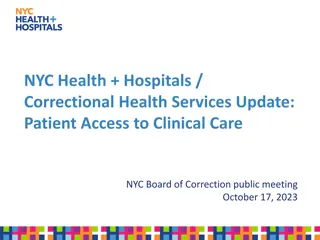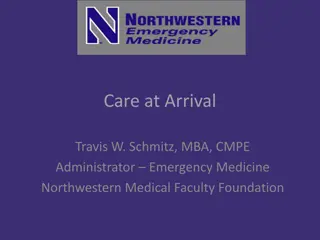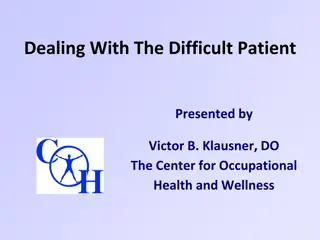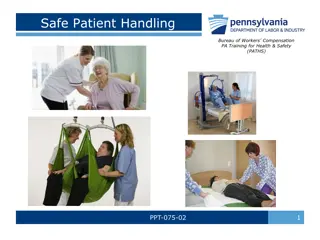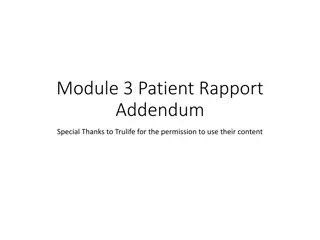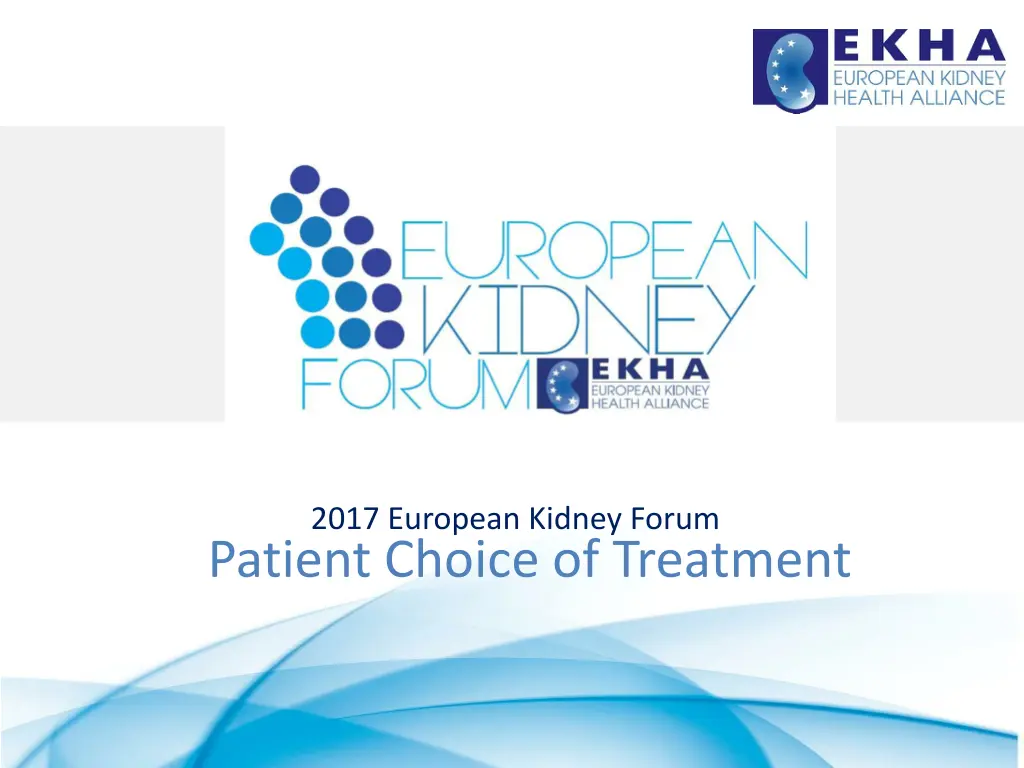
Factors to Consider in Studying Health Inequalities in Kidney Care
Explore the factors influencing health inequalities in kidney care in Europe, focusing on patient choice of treatment, sustainability of kidney care, economic impact, and quality of life outcomes. Factors such as transplantation and home dialysis strategies offer the highest survival and quality of life. This analysis aims to address key considerations for improving kidney health outcomes.
Download Presentation

Please find below an Image/Link to download the presentation.
The content on the website is provided AS IS for your information and personal use only. It may not be sold, licensed, or shared on other websites without obtaining consent from the author. If you encounter any issues during the download, it is possible that the publisher has removed the file from their server.
You are allowed to download the files provided on this website for personal or commercial use, subject to the condition that they are used lawfully. All files are the property of their respective owners.
The content on the website is provided AS IS for your information and personal use only. It may not be sold, licensed, or shared on other websites without obtaining consent from the author.
E N D
Presentation Transcript
2017 European Kidney Forum Patient Choice of Treatment
EKHA Membership A strategic alliance of European non-profit organisations representing ALL key stakeholders in kidney health: patients, nephrologists, researchers and allied health workers Full Members - founding members of the Alliance: EKPF: European Kidney Patients Federation (formerly CEAPIR) IFKF: International Federation of Kidney Foundations ERA-EDTA: European Renal Association European Dialysis and Transplant Association EDTNA-ERCA: European Dialysis and Transplant Nurses Association European Renal Care Association
EKHAs Membership Associate Members - European national and other non-profit kidney organisations: 1. Austria: Austrian Society of Nephrology 8. Portugal:Portuguese Society of Nephrology 9. Poland: Polish Kidney Association 2. Bosnia:Society of Nephrology, Dialysis and 10. Russia:Russian Dialysis Society Transplantation of Bosnia & Herzegovina 11. Slovenia:Slovenian Society of Nephrology 3. Estonia: Estonia Society of Nephrology 12. Spain:Sociedad Espa ola de Di lisis y Trasplante 4. France:French Speaking Society of Dialysis 13. Spain:Spanish Dialysis Foundation 5. Germany:German Society of Nephrology 14. Spain: Spanish Society of Nephrology 6. Georgia:Georgian Union of Dialysis, 15. Turkey:Turkish Society of Nephrology Nephrology and Transplantation 16. UK:Renal Association of the UK 7. Netherlands:Dutch Kidney Patient Association
What are the factors to be considered when studying health inequalities in kidney care in Europe? Multi-Country Survey of Patient Choice of RRT in Europe Goal: to explore and address the patient choice of treatment (or lack thereof) in select Member States and address how it relates in the context of sustainability of kidney care, economic impact on health systems, and outcomes impact on the patient and his or her quality of life.
Which factors should we take into account? The highest survival and quality of life is offered by transplantation followed by home dialysis strategies (PD and home HD)
Which factors should we take into account? The highest survival and quality of life is offered by transplantation followed by home dialysis strategies (PD and home HD) Among dialysis strategies, patients preference goes towards home strategies, irrespective of whether they are treated in center or not
Which factors should we take into account? The highest survival and quality of life is offered by transplantation followed by home dialysis strategies (PD and home HD) Among dialysis strategies, patients preference goes towards home strategies, irrespective of whether they are treated in center or not TP and Home strategies are more cost-effective to societies
Survey Methodology 8 countries in various regions of Europe were recruited UK France Netherlands Slovenia Lithuania Spain Greece Portugal (too few responses to use in comparisons)
Survey Methodology 8 countries in various regions of Europe were recruited UK France Netherlands Slovenia Lithuania Spain Greece Portugal (too few responses to use in comparisons) 1 survey of patients and 1 survey for health care professionals to compare and contrast
Survey Methodology 8 countries in various regions of Europe were recruited UK France Netherlands Slovenia Lithuania Spain Greece Portugal (too few responses to use in comparisons) 1 survey of patients and 1 survey for health care professionals to compare and contrast Survey translated in local languages (2 per country x 8 = 16 surveys)
Survey Methodology 8 countries in various regions of Europe were recruited UK France Netherlands Slovenia Lithuania Spain Greece Portugal (too few responses to use in comparisons) 1 survey of patients and 1 survey for health care professionals to compare and contrast Survey translated in local languages (2 per country x 8 = 16 surveys) Conducted online: Survey Monkey
Survey Methodology 8 countries in various regions of Europe were recruited UK France Netherlands Slovenia Lithuania Spain Greece Portugal (too few responses to use in comparisons) 1 survey of patients and 1 survey for health care professionals to compare and contrast Survey translated in local languages (2 per country x 8 = 16 surveys) Conducted online: Survey Monkey Survey deployed via EKHA s member networks (national patient, national nurse, and national physician societies)
RISK OF BIAS Participant bias of patients/professionals who have internet access and are web savvy, and have time and interest in giving a response
RISK OF BIAS Participant bias of patients/professionals who have internet access and are web savvy, and have time and interest in giving a response Because of time restrictions, we can only offer the results of the comparison country by country
PARTICIPATION COUNTRY PATIENTS PROFESSION. Spain 163 120 France 78 55 UK 110 75 Greece 136 101 Lithuania 52 35 Slovenia 28 16 Netherlands 95 49 Portugal 0 9
PARTICIPATION COUNTRY PATIENTS PROFESSION. INHABITANTS Spain 163 120 46 France 78 55 64 UK 110 75 65 Greece 136 101 11 Lithuania 52 35 3 Slovenia 28 16 2 Netherlands 95 49 17 Portugal 0 9
PARTICIPATION COUNTRY PATIENTS PROFESSION. INHABITANTS Spain 163 120 46 France 78 55 64 UK 110 75 65 Greece 136 101 11 Lithuania 52 35 3 Slovenia 28 16 2 Netherlands 95 49 17 Portugal 0 9 Total 662 460
Patient views Page 21
Number of answers per gender 100% 90% 80% Percentage of professionals 70% 60% Prefer not to respond 50% Male Female 40% 30% 20% 10% 0% FR UK NL SP GR SL LI
Number of answers per age 100% 90% 80% Percentage of professionals more than 80 70% 60-79 60% 45-59 50% 30-45 40% 18-29 30% Less than 18 20% 10% 0% FR UK NL SP GR SL LI
What RRT method are you currently on? 100% 90% Conservative care 80% Percentage of patients 70% Living with functioning kidney transplant Peritoneal dialysis 60% 50% Home and self-care haemodialysis In-centre haemodialysis 40% 30% 20% 10% 0% FR UK NL SP GR SL LI
In the period before your start on RRT, were you told that there are different treatment options? 100% 90% 80% Percentage of patients 70% 60% No 50% Yes 40% 30% 20% 10% 0% FR UK NL SP GR SL LI
How long before starting were you told that there are different treatment options? 100% 90% 80% Percentage of patients 70% More than 12 months 60% 4-12 months 50% 1-3 months 40% Less than 1 month 30% 20% 10% 0% FR UK NL SP GR SL LI
In the period before the start of RRT, do you think you received enough information about peritoneal dialysis? 100% 90% 80% Percentage of patients 70% 60% No 50% Yes 40% 30% 20% 10% 0% FR UK NL SP GR SL LI
In the period before the start of RRT, do you think you received enough information about home haemodialysis? 100% 90% 80% Percentage of patients 70% 60% No 50% Yes 40% 30% 20% 10% 0% FR UK NL SP GR SL LI
In the period before the start of RRT, do you think you received enough information about overnight haemodialysis? 100% 90% 80% Percentage of patients 70% 60% No 50% Yes 40% 30% 20% 10% 0% FR UK NL SP GR SL LI
Do you think you received enough information about kidney transplantation (living and deceased donor)? 100% 90% 80% Percentage of patients 70% 60% No Yes 50% 40% 30% 20% 10% 0% FR UK NL SP GR SL LI
If kidney transplantation was discussed, were all options presented to you? 100% Neither were discussed 90% 80% Percentage of patients 70% Both were discussed 60% 50% Only living donation was discussed 40% 30% 20% Only deceased donation was discussed 10% 0% FR UK NL SP GR SL LI
Was your family (spouse, partner, children, parents, other important persons) included in the discussion? 100% 90% 80% Percentage of patients 70% 60% No 50% Yes 40% 30% 20% 10% 0% FR UK NL SP GR SL LI
Which person or source offered you the most useful information about RRT? Other 100% 90% Internet 80% Educational materials Percentage of patients 70% Educational programme 60% Other patient (s) 50% Nurse 40% General practicioner (house doctor) Other specialist physician 30% 20% 10% Nephrologist 0% FR UK NL SP GR SL LI
If different treatment methods were discussed with you, were you given a choice of which one you preferred to proceed with? 100% 90% 80% Percentage of patients 70% 60% No 50% Yes 40% 30% 20% 10% 0% FR UK NL SP GR SL LI
If you wanted to change treatment, was your wish then addressed by your health care professional 100% 90% 80% 70% Percentage of patients 60% No 50% Yes 40% 30% 20% 10% 0% FR UK NL SP GR SL LI
Physician & nurse views Page 36
In your centre, is it a standard procedure to offer candidates for RRT information about peritoneal dialysis? 100% 90% 80% Percentage of professionals 70% 60% No 50% Yes 40% 30% 20% 10% 0% FR UK NL SP GR SL LI
Patient view: In the period before the start of RRT, do you think you received enough information about peritoneal dialysis? 100% 90% 80% Percentage of patients 70% 60% No 50% Yes 40% 30% 20% 10% 0% FR UK NL SP GR SL LI
If not, then why? 100% 90% Other Percentage of professionals 80% No specific reasons 70% No interest from the hospital management/dialysis provider 60% Limited information available 50% Limited trained staff 40% 30% Limited training options 20% Limited reimbursement 10% 0% FR UK SP GR SL LI
Thanks & Acknowledgments Special thanks to the following EKHA members and organisations for helping us to carryout this survey:
CONCLUSIONS (1) Substantial heterogeneity among countries
CONCLUSIONS (1) Substantial heterogeneity among countries In no country all options are offered at 100%
CONCLUSIONS (1) Substantial heterogeneity among countries In no country all options are offered at 100% Lack of patient education for sustainable options
CONCLUSIONS (1) Substantial heterogeneity among countries In no country all options are offered at 100% Lack of patient education for sustainable options Some sustainable options are not offered due to
CONCLUSIONS (1) Substantial heterogeneity among countries In no country all options are offered at 100% Lack of patient education for sustainable options Some sustainable options are not offered due to Lack of interest by the hospital/dialysis provider
CONCLUSIONS (1) Substantial heterogeneity among countries In no country all options are offered at 100% Lack of patient education for sustainable options Some sustainable options are not offered due to Lack of interest by the hospital/dialysis provider Lack of specifically trained staff
CONCLUSIONS (2) Among TP options, living donation is often discriminated
CONCLUSIONS (2) Among TP options, living donation is often discriminated Not offering an option is often part of a vicious circle (no patient information, no demand, no offering, no patient information)
CONCLUSIONS (2) Among TP options, living donation is often discriminated Not offering an option is often part of a vicious circle (no patient information, no demand, no offering, no patient information) Free choice is hampered by financial drivers and lack of trained staff
CONCLUSIONS (2) Among TP options, living donation is often discriminated Not offering an option is often part of a vicious circle (no patient information, no demand, no offering, no patient information) Free choice is hampered by financial drivers and lack of trained staff The opinion of the patient and his/her family are often neglected



